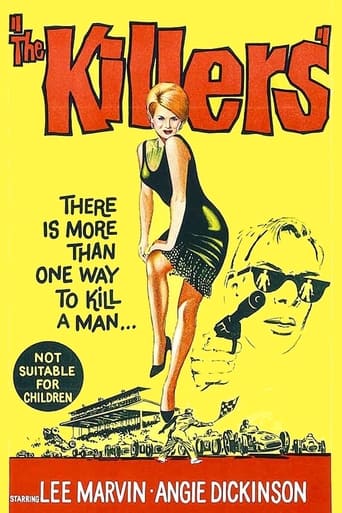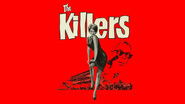Philip Cowan
Fine acting, a twisted plot, gorgeous cinematography and a tight script all combine to make as near-perfect a thriller as you could expect.
YourTearingMeApart
This was a cool little film noir from 1964 that flew under my radar until now. Lee Marvin is great in any scene he's ever been in, in my book, so this was a feast of scenes for him to chew. He's a little less gruff than in my other favorites such as The Big Red One and The Dirty Dozen but what he lacks in gruff he makes up in cool. And fellow hit-man partner Clu Gulager (who I've met) is a super wise ass with some great lines and kind of grew on me as the movie went along. Angie Dickson (who I've met) is decent. Ronald Regan(!) plays the heavy which is just kind of weird. He does a decent job and comes off as a little bit threatening in most scenes. John Cassavetes is great as the race car driver who gets seduced and used. Lots of familiar faces throughout the movie such as Norman Fell and Claude Akins. It's definitely a B-movie with a thread of a budget but what it lacks in money it makes up for with cool camera angles and a tight little yarn that tells the story within the story as it goes along. Its a very amoral with at least 2 scenes of Angie getting slapped, punched and worse! I'm sure this move was super controversial in its day (and even today). I give it 8 out of 10 stars. And remember "the only man that's not afraid to die is the man that's dead already." - Stay Sick!
gavin6942
One morning, hit men Charlie (Lee Marvin) and Lee (Clu Gulager) enter a school for the blind and terrorize the principal until she reveals the whereabouts of a teacher, Johnny North (John Cassavetes).There are plenty of notable things about this movie, not least of which is the cast. Beyond the three mentioned above, you have Ronald Reagan as a mob boss and Angie Dickinson. Have you ever seen Reagan play a nasty villain who likes to slap the ladies? Not until you see this. Also notable is the made-for-TV status (even if it fell through) and the direction of Don Siegel.Most interesting is the continuity of the source material. Hemingway's short story is just that -- very short, focusing mainly on the killing of one man. In the 1946 Robert Siodmak version, we get what happened before the killing, and here we get what happened after. If it was not for the twenty year time change and new cast, these stories could actually go together and be less of a remake and more of a sequel.
jgcole
This 1964 remake of director Robert Siodmak's 1946 masterpiece again uses Ernest Hemingway's short story as the catalyst for a crime story: A man learns that there is a contract out on him. He is about to be killed but accepts it passively, not attempting to save his own life. The man in question is Johnny North. Johnny gets involved with a dangerous dame and lets her talk him into participating in a robbery. The robbery goes wrong, the money disappears, and all things point to Johnny as the culprit. But Johnny is consumed by guilt and betrayal and has lost the will to go on, the will to live. Like the original, much of the story is told in flashbacks but in this one it's from the killers point of view. Lee Marvin plays Charlie, one of the killers hired to do the hit on Johnny North (played by John Cassavetes) and Charlie wants to know why a man doesn't run, why he allows himself to be killed. He also wants to know what happened to the money from the heist. Johnny doesn't have it and the guy who hired him didn't ask him to find it. That's not right and Charlie sets out to find out what happened and where the money is.This film is part of an impressive lineup of '60's crime and detective stories that came out after the end of the film noir period - Harper, Point Blank, Bullitt. This one was originally shot for television and was intended to be the first feature length made for TV movie. But director Don Siegel, who wanted the job in 1946, made a film that he had to know would never get past the censors. And, of course, it was rejected by NBC after completion because it was unsuitable for TV audiences. And the film looks like it was made for TV. The cinematography seems a bit uninspired with rather flat color and stark set designs and some really bad process shots. But while it visually lacks the moody film noir feel of the 1946 version, there is no lack of bad behavior, violence, misogyny, corruption and greed.Marvin was great in this film and Clu Gulagar was the perfect psycho-killer sidekick to Marvin's understated thinking thugs' thug. Angie Dickinson plays Sheila Farr, the gun moll that Ava Gardner played in the 1946 original and is every bit the sociopath that Gardner's Kitty was and just as fatal. Angie was a very good looking girl and her star was on the rise in '64. They had her in a collection of sexy dresses that showed off a wonderful physique and of course she had that hair going. And in his last screen role (though he wasn't done acting), Ronald Reagan plays Jack Browning, the head of the criminal organization that pulls off the heist. Of course this went against type for Reagan who usually played sympathetic roles and, really, it is hard to picture Reagan as a criminal mastermind. Anyway, the affable Reagan was unsure about playing a bad guy. He later said it was a mistake for him to take the part and felt bad about the famous scene where he slaps Angie - hard! Angie also gets roughed up by Gulagar and Marvin in a scene in Sheila's hotel room and later said that she thought they were too enthusiastic and that Marvin actually scared her. She said she would never work with him again but relented a few years later when she played opposite him in Point Blank. She has a scene in that one where her character gets some free shots on Marvin and Angie hits him like she means it.All in all it's a fun movie and definitely worth a view. If you've seen the 1946 version you'll find that while it pales in comparison, it is different enough to still be enjoyable. And if you haven't seen the original you'll find this an entertaining film. Either way it is an interesting look at the state of the television art c.1964 and just what wouldn't get past the censors.





